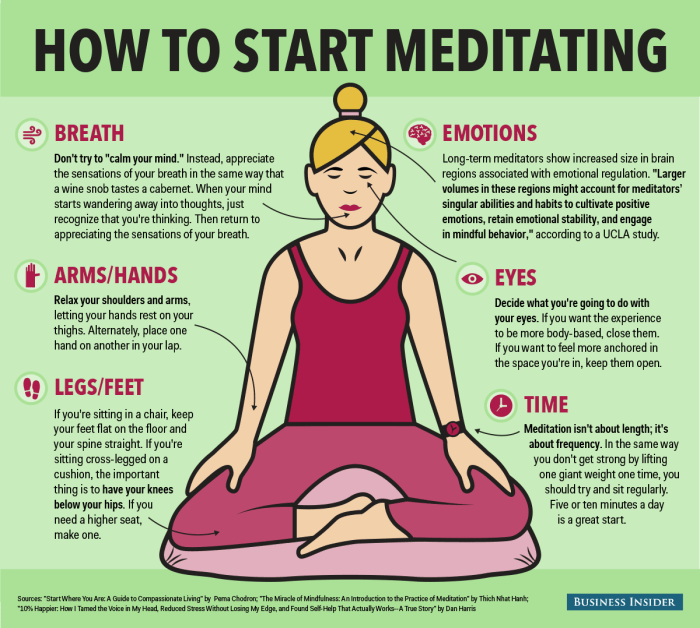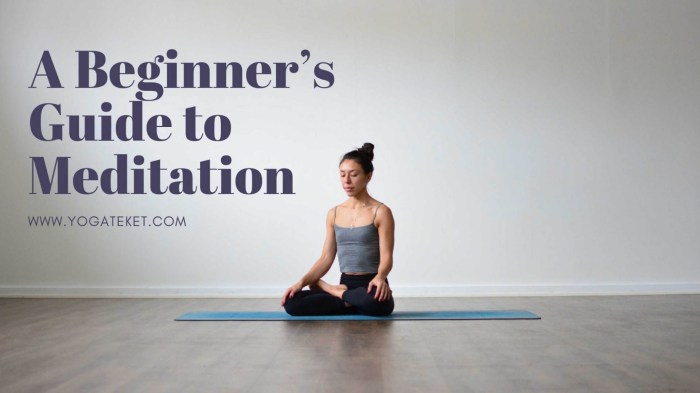Meditation for Beginners takes center stage, inviting you into a world of peace and mindfulness. Get ready to dive into the art of meditation with this comprehensive guide tailored just for you.
Embark on a journey to discover the benefits, techniques, and challenges of meditation as a beginner. Let’s explore the path to a calmer mind and a more focused life together.
Understanding Meditation: Meditation For Beginners
Meditation is a practice that involves focusing the mind and eliminating distractions to achieve a state of mental clarity and emotional calmness. It has numerous benefits for overall well-being and can help reduce stress, improve concentration, and promote mindfulness.
Types of Meditation Practices
There are various types of meditation practices, each with its own unique techniques and approaches:
- Mindfulness Meditation: Focuses on being present in the moment and observing thoughts and sensations without judgment.
- Transcendental Meditation: Involves repeating a mantra to quiet the mind and achieve a state of deep relaxation.
- Loving-Kindness Meditation: Focuses on cultivating feelings of compassion and love towards oneself and others.
- Guided Visualization: Involves imagining peaceful scenes or experiences to promote relaxation and reduce stress.
Common Misconceptions about Meditation
Despite its popularity, there are some common misconceptions about meditation:
- Meditation is only for spiritual or religious purposes.
- You have to clear your mind completely to meditate successfully.
- Meditation requires a lot of time and effort.
Benefits of Meditation for Mental Health
Meditation has been shown to have a positive impact on mental health in various ways:
- Reduces stress and anxiety levels.
- Improves focus and concentration.
- Promotes emotional well-being and self-awareness.
- Helps manage symptoms of depression and PTSD.
Getting Started with Meditation

Meditation is a powerful practice that can bring calmness and clarity to your mind. To get started with meditation, it’s important to create the right setting, find a comfortable posture, establish a routine, and focus on breathing techniques.
Ideal Setting for Meditation
Creating an ideal setting for meditation is essential for a successful practice. Find a quiet and peaceful space where you won’t be disturbed. Dim the lights, play soft music or nature sounds, and consider using essential oils or incense to enhance the atmosphere.
Comfortable Posture for Meditation
Finding a comfortable posture is key to maintaining focus during meditation. Sit on a cushion or chair with your back straight but not rigid. Rest your hands on your lap or knees, close your eyes, and relax your shoulders. Experiment with different positions to find what works best for you.
Establishing a Consistent Meditation Routine
Consistency is key when it comes to meditation. Start by setting aside a specific time each day to meditate, whether it’s in the morning, during lunch break, or before bed. Start with just a few minutes and gradually increase the duration as you become more comfortable with the practice.
Role of Breathing Techniques in Meditation
Breathing techniques play a crucial role in meditation as they help to calm the mind and body. Focus on deep, slow breaths, inhaling through your nose and exhaling through your mouth. Pay attention to the rise and fall of your chest and belly with each breath, and use it as an anchor to bring your attention back whenever your mind starts to wander.
Mindfulness in Meditation

Mindfulness is the practice of being fully present and aware of your thoughts, feelings, sensations, and surroundings without judgment. In meditation, mindfulness plays a crucial role in helping individuals focus on the present moment and cultivate a sense of inner peace.
Integrating Mindfulness into Daily Activities
- Start your day with a mindfulness meditation to set a positive tone for the day.
- Practice mindful breathing while commuting or doing household chores to stay grounded.
- Engage in mindful eating by savoring each bite and being aware of the flavors and textures.
Mindfulness Exercises for Beginners, Meditation for Beginners
- Body Scan: Lie down or sit comfortably and focus on each part of your body, noticing any tension or sensations.
- Breath Awareness: Pay attention to your breath as you inhale and exhale, feeling the rise and fall of your chest or abdomen.
- Walking Meditation: Take a slow walk, focusing on each step and the sensations in your feet as they touch the ground.
Connection between Mindfulness and Awareness in Meditation
Mindfulness enhances awareness during meditation by training the mind to stay present and observe thoughts without getting caught up in them. This leads to a deeper sense of clarity and insight.
Overcoming Challenges in Meditation
Starting a meditation practice can be challenging for beginners, as it requires focus and mental discipline. Here are some common challenges that beginners may face and strategies to overcome them.
Dealing with Distractions During Meditation Sessions
Distractions are a common challenge during meditation sessions. To deal with distractions, try to acknowledge them without judgment and gently bring your focus back to your breath or mantra. You can also try meditating in a quiet, peaceful environment to minimize distractions.
Handling Restlessness or Discomfort While Meditating
Restlessness or discomfort may arise while meditating, especially if you are not used to sitting still for extended periods. To handle restlessness or discomfort, try adjusting your posture or taking a short break to stretch. You can also practice gentle yoga or walking meditation to release tension and restlessness.
Staying Motivated and Committed to a Meditation Practice
Staying motivated and committed to a meditation practice can be challenging, especially when you don’t see immediate results. To stay motivated, set realistic goals and track your progress. Find a meditation technique that resonates with you and make it a daily habit. Surround yourself with a supportive community or join a meditation group to stay inspired and accountable.
